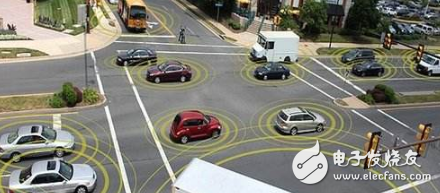Internet giants rush to attack the Internet of Things car market BMW, Ford also come to hot spots
Traditional car companies have started the wave of IoT car transformation, and the development of Zhixing car is imperative in China. The concept of “new energy†has been sought after by the public. In the past 15 months, China has more than 400,000 IoT cars on the road. It is reported that BMW and Ford have also come to rush to make IoT cars, and Chinese intelligence has been burned to the car factory.
Traditional automakers are facing transformational demands. China's Internet giants have rushed to attack. China has become the world's largest auto producer in 2017, surpassing the US for the first time. The century-old auto brands BMW and Ford have chosen China as the IoT vehicle development base.

Cars used to be mainly used as a means of transportation, but the emergence of the Internet has allowed cars to create added value. The data is called the “new energy†in the network era. The car is carrying the life data of most people. It is naturally a “new oil field†that each family is scrambling to dig. This trend is not only the smart electric vehicle manufacturer Tesla. Grabbing in, the century-old car manufacturers BMW, Ford also attacked, China is their new battlefield.
According to Ali's footprint, China became the world's largest auto producer in 2017 for the first time. The total production of automobiles may exceed the number of 17 million in 2016, reaching more than 20 million, surpassing the US for the first time; Accenture And the automotive industry consulting firm SBD predicts that by 2020, the global sales of new vehicles with networking technology will reach more than 200 million units, and the penetration rate will be close to 60%. China's auto production coupled with the trend of global smart networks, the development of smart connected cars is imperative in China.
BMW and Alibaba Cloud, combined with AI speakers to optimize the car experienceOn December 20, 2017, at the Beijing Yunqi Conference, Alibaba and BMW China officially announced that the two parties will cooperate in the Internet of Things to provide BMW users with remote services that are seamlessly connected from home to car. Based on BMW's cloud interconnection and Alibaba Cloud Link platform, car owners can use the AI ​​speakers that support Alibaba Cloud Link Voice technology at home to understand the current state of the car through voice query.
Ding Xianfeng, chief scientist of Ali Yunzhi Network, said that Alibaba Cloud is committed to using the Internet of Things and machine intelligence technology to promote all things to achieve intelligent networking. This cooperation with BMW China hopes to realize the three worlds of people, cars and homes in the digital world. An innovative experience of seamless connectivity. The "car + home" service is expected to be launched in the first half of 2018. It is planned to be used for BMW's cloud-connected models sold in China. At that time, BMW car owners can directly ask "real-time cruising range, whether the window has been used or not." Vehicle information and status such as closed, current door status.
Zheng Zhaodong, vice president of digital user services and digital user channels at BMW China, said that the BMW Group is committed to shifting from a traditional high-end car manufacturer and service provider to a technology company, while interconnection, service, electrification and automation are new Strategic core. China is the driving force behind innovation in advancing the strategy globally.
Ford signed a three-year agreement with AliOS to announce the "China 2025 Plan"In addition to BMW, another automaker, Ford, also announced a partnership with Alibaba. On December 7, 2017, Alibaba Group and Ford Motor Company officially signed a strategic cooperation. The two companies will jointly promote cooperation in the fields of smart connected vehicles, artificial intelligence, intelligent mobile services and digital marketing. In this three-year agreement, Alibaba's AliOS automotive operating system, cloud computing, new retail, digital marketing, etc. The business sector will participate in the cooperation; Ford also said that all future Ford, Lincoln brand vehicles (including imported and local production) sold in China, and self-owned brand electric vehicles produced in China will also become part of the cooperation.
Flowserve announced the "China 2025 Plan", which aims to produce more than 50 new models by the end of 2025, and will increase the number of sports-type recreational vehicles (SUVs), smart interconnection and motorization. Ford Motor Company President and CEO Han Yute added that China is undoubtedly one of the largest and most dynamic digital markets in the world. People's diversified demand for online and offline experience is driving business innovation and innovation. Under the vision of creating a smart car in the world, Ford will be committed to a smart mobile travel experience.
In the past 15 months, more than 400,000 IoT cars have been on the road in China.Looking at the business opportunities of the Internet of Things, the Chinese Internet giant is actively attacking. At the end of 2017, Tencent released the “AI in Car†system, combining voice, scene, Weibo social, news content, etc., and revealed that it will open gestures and AR interaction; Alibaba will bind the license plate to Alipay, and the driver only needs to make an online reservation. Parking spaces, when the vehicle enters and exits the parking lot, the scanning license plate can be automatically paid online.
According to the survey data of JATO Dynamics, a British data firm in May 2017, among the top 10 electric vehicle brands in the world, “Chinese car dealers†accounted for 50%. China Automotive Research and Technology Center pointed out that in 2020, the annual sales of new electric vehicles in China will reach 4 million; in 2025, the annual sales of electric vehicles and plug-in hybrid vehicles will soar to 10.6 million. It accounts for 30% of the Chinese auto market.
LED Flexible Light Strip
Kindwin Technology (H.K.) Limited , https://www.szktlled.com